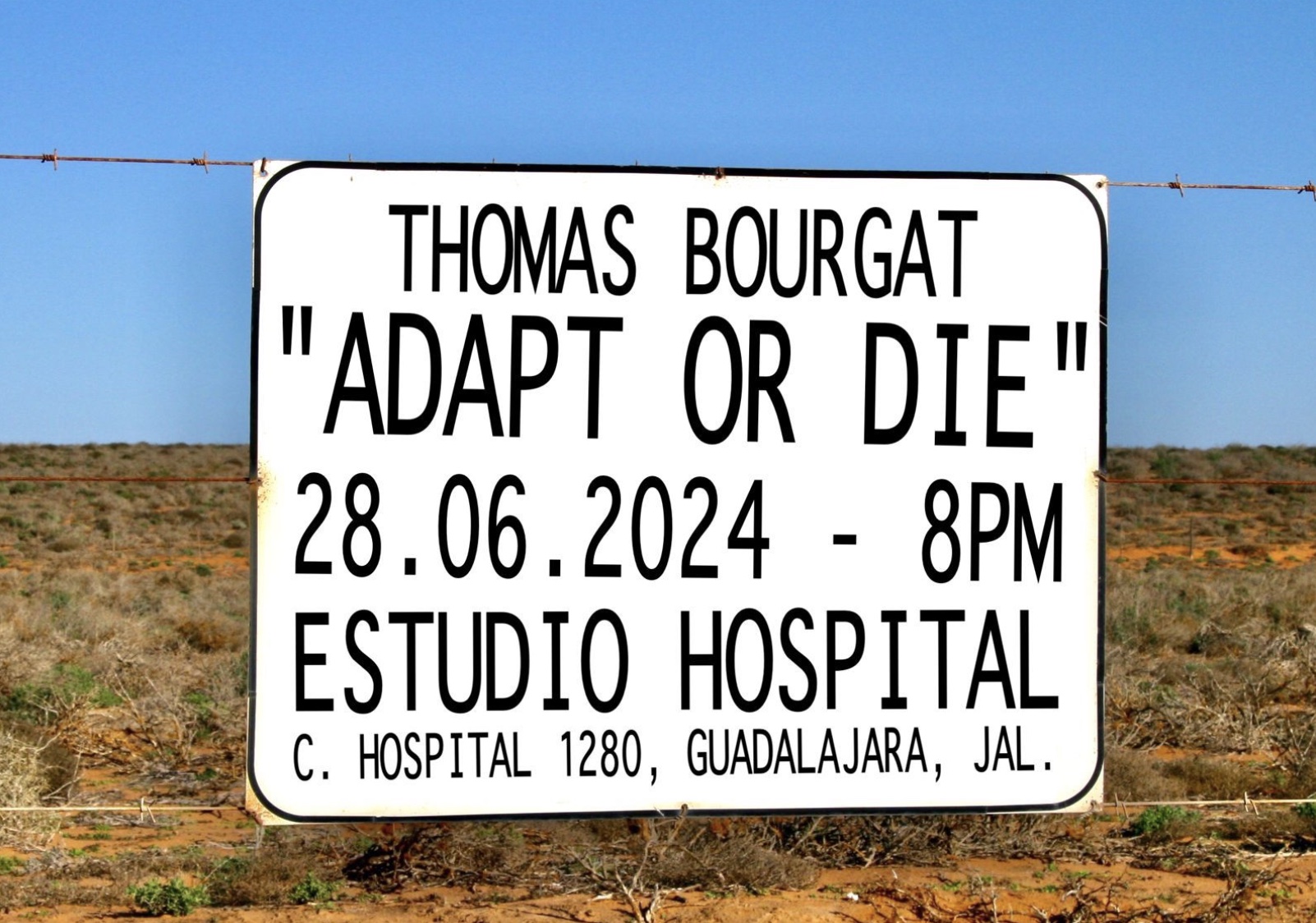
Thomas Bourgat
Adapt or die (Adaptarse o morir)
Exhibition
-> Jun 28 2024 – Jul 11 2024
Estudio Hospital presents this exhibition with the work of Thomas Bourgat (emerging artist of French nationality, currently residing in Guadalajara), commissioned by Cristian Franco and Renata Petersen, titled Adapt or die. It is the result of a month-long road trip through South Africa in 2023, the country where Thomas grew up. The exhibition will explore Bourgat's work, a visual journey that captures the essence of transformation and improvement. It will feature a series of photographs taken in various locations throughout the trip, it will also include other pieces.
I met Thomas Bourgat and his father in June 2023, during their journey through South Africa. We sat together and had coffee, and from different continents, cultures, and diverse backgrounds, civilized people sat and enjoyed each other's culture, shared their search for the truth, and experiences from their own lives.
Thomas Bourgat took this series of photos during his month-long journey through South Africa in June 2023. Thomas' family moved to Cape Town, South Africa, in 1998 before he was two years old and later moved away in 2007 when he was ten. Cape Town saw this young man grow up during his childhood, which Thomas considers the happiest moments of his life. He remembers Cape Town in the 2000s as a place filled with hope for South Africa’s future. Thomas has never grown moss on his back and, like a rolling stone in life, has never spent more than ten years in one place. Between France, South Africa, Italy, and Mexico, South Africa is where he has spent the most time in his life.
These photos were not meant to be shown to anyone; Thomas simply wanted to document his road trip. This time, back in South Africa as an adult, Thomas wanted to see new places and discover a different reality from his childhood. He visited places that only people who understand South Africa would visit, places a tourist would not consider visiting.
One place he stopped at, for example, was Kleinfontein. A small settlement where a group of people who identify with the freedom and aspirations of the Boer people has formed an enclave. Amidst a “rainbow” new South Africa, he visited this white Boer settlement outside Pretoria. Thomas is under no illusion that South Africa is a highly political place – a place of diversity and opposites: Diverse cultures and civilizations, tranquil, breathtaking natural beauty, and extremely dangerous, violent crime. He hoped that these positive poles of the country had not changed too much from his childhood memories. Certain things had not... The faithful colossal Table Mountain awaited him when he arrived in Cape Town. This natural monument that greets you with every morning’s coffee deeply stirred his nostalgic soul.
However, the negative pole had begun to cast an ever larger shadow over a once beautiful country. More than Thomas was used to. It testifies to direct and indirect violence. History is engraved in scars on the land with pain, violence, and inhumanity. It was this growing darkness of violence that connected every stop for Thomas. This raw exhibition is the unfiltered expression of an unknown, unpublished, and hidden South Africa through Thomas’ eyes.
Thomas does not feel French or identify with any specific country from which he comes. In South Africa, there are also a variety of ethnic groups. Race celebrations and the racist Apartheid under Verwoerd have just been exchanged for black racism under the ANC. Between the media and opportunistic politicians, tremendous racial tension and polarization between races and income groups develop. Several names of streets, towns, buildings, and institutions established by the Boer people are alienated to black names. This trend is even enshrined in the constitution of South Africa that “the past must be reckoned with.”
Between gang violence, transit robberies, farm murders, traffic signs warning of “hijack hotspots,” and load shedding (where there are schedules for when certain parts of the country will not have power), the wind whispers over the plains, the animals graze and want to continue peacefully, and people party and go to work.
— Dr Wilhelm Pretorius